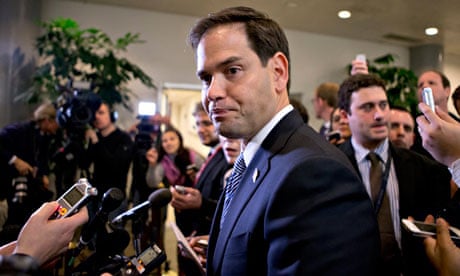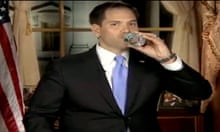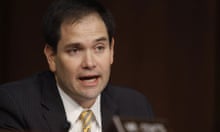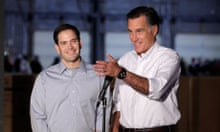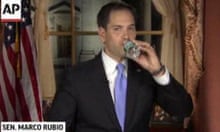Every once in a while, there is a political leader who comes along as a saviour for his or her party. Names like Abraham Lincoln, Franklin D Roosevelt, and Ronald Reagan are examples of politicians who marked the beginning of new political eras. Many have pointed to Marco Rubio as one who may follow in these men's footsteps – and lead his party to victory in the 2016 presidential election.
Rubio is said by some to be the candidate who could reverse the Republicans' very poor electoral showing with the growing proportion of the electorate that is Latino. He has emerged as the leading GOP figure among the "gang of eight" senators proposing bipartisan reform of the nation's immigration law – as a Tea Party favorite, he has even made strides in winning round opinion among strongly conservative talk radio audiences on this policy. And finally, he has been anointed to deliver the Republican party's response to President Obama's state of the union address on Tuesday night: the gift of a national stage to a rising star.
But at this point, I just don't see the 2016 saviour scenario happening for the senator from Florida. Why not?
1. Republicans like to choose the next in line
Since 1960, it's been fairly easy to predict who would be the Republican nominee. Every candidate except for Barry Goldwater has either run for national office previously or been the son of someone who has. Mitt Romney ran in 2008, before winning the nomination in 2012. John McCain took on George W Bush in 2000, before clinching the nomination in 2008. Bob Dole ran as a vice-presidential nominee in 1976 and a presidential candidate in 1980 and 1988, until he finally broke through in 1996. The list goes on and on.
The best example is Ronald Reagan. He was someone who supposedly took on the Republican old guard, who thought he was too conservative and distrusted his "voodoo economics". The fact is that Reagan had actually first run in 1968 as a conservative outsider and lost. He was more successful in his challenge to Gerald Ford in 1976, but still came up short. It wasn't until he was well-established and entered 1980 as a front-runner that he took the nomination.
Marco Rubio has never run for president, nor appeared on a national ticket. That's not to say this rule is ironclad, by any means, but Rick Perry, Rick Santorum, and most importantly, Paul Ryan are all in better position per this criterion.
2. Republicans choose the candidate backed by the establishment
One could argue that rule 1 is a manifestation of rule 2, but the fact is that Democrats and Republicans tend to pick the candidate with establishment support. That's the thesis of the book The Party Decides. The idea is that the candidate who has the most party backing almost always wins.
Thus George W Bush in 2000, who had never run for national office before, won lots of endorsements from the party bigwigs. And we saw how elected officials carried Romney to victory by coming out and bashing Newt Gingrich in 2012, at the moment when he threatened Romney's lead in the primaries.
Marco Rubio is, at this point, almost the antithesis of the Republican establishment. He won his Senate seat in 2010 by challenging the party pick Charlie Crist. Once in Washington, Rubio has continued his anti-establishment ways. His second-dimension "DW-Nominate" score, which has been a pretty good measurer of establishment activity, is negative. From the debt ceiling to the fiscal cliff, Rubio has consistently voted against legislation that the leadership voted for.
3. Rubio is likely too conservative
People may be being fooled, currently, into thinking that Rubio is a middle-of-the-road politician. After all, he's from the swing state of Florida and is sponsoring immigration reform. Rubio was, in fact, the seventh most conservative senator in the 112th Congress. His voting record puts him sandwiched between arch-conservatives Jim Inhofe and Ron Johnson.
Very conservative nominees can win a party's nomination, as did Barry Goldwater and Ronald Reagan. The issue for Rubio, though, is that these folks became nominees when the party had just recently been in the White House. When the party has been out for two terms or more, the nominees tend to be a lot more moderate – because the party wants to win and wants a centrist pick. The most conservative nominee after the party had been out of office for more than two terms was George W Bush, the "compassionate conservative" who, at the time, was not seen nearly as rightwing as he later was.
Rubio running from the right doesn't make too much sense, especially considering that, these days, somewhat conservative and moderate voters hold a 2:1 advantage over very conservative voters in Republican presidential primaries.
4. Rubio is largely an unknown
How much do we really know about Marco Rubio, and how he'd perform on the big stage? I mean, besides making a Time Magazine cover story, Rubio is quite untested. With relatively little media scrutiny, he had to fight through a credit card expenses scandal (an Ethics Commission ultimately threw out the case); he has also been exposed as having embellished his family history about his parents' flight from Fidel Castro's Cuba.
The fact is that we are almost always surprised by what candidates look like once they are under the spotlight. We found out that Rick Perry couldn't debate to save his life. Newt Gingrich's outsider status was severely compromised by his lobbying activity when he was out of office. Gary Hart had, in fact, been involved in a sexual affair.
If past experience holds, there are bound to be more awkward questions for Rubio than he has hitherto faced.
5. A Rubio run would face a competitive GOP field
This one is, perhaps, the most obvious: there are potentially a lot of very plausible Republican nominees. Jeb Bush, Chris Christie, Mike Huckabee, Bobby Jindal, Rand Paul, Rick Perry, and Paul Ryan are all not so far-fetched names for a run in 2016. Half of these candidates are more impressive than the Republicans that ran in 2012. Even if Rubio leads a very, very early field, the other candidates combined total 80%. The probability of one of these other hypothetical candidates winning is far greater than Rubio's chance of taking the pie.
Conclusion
If Rubio takes the plunge for 2016, I would bet against him. Given the hurdles a Rubio candidacy would face, I honestly wouldn't be surprised if he never runs at all.
